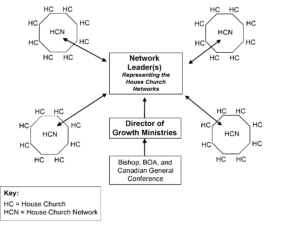House churches can function effectively within the FMCIC where there is understanding as to how the partnering relationship between the house churches and the FMCIC works; how the roles of approved leaders fit into the current denominational structure; and, how the house churches fit into the larger accountability structure of the FMCIC.
Five unique characteristics of house churches are:
a. These house-sized communities are full functioning churches, not small groups.
b. House churches will focus on Christ centered relationships and might not organize themselves into any form that looks like a “service” or “program.”
c. Every approved house church leader is released to be a responsible minister in his/her community.
d. House churches do not intend to own real property or buildings specifically used for church gatherings.
e. House churches intend to grow by multiplying new house churches, not by simply adding to the existing groups.
House churches best multiply through the intentional training and approval of “non-ordained” local leaders. These leaders administer the most important actions in ministry. This includes baptisms, funerals, marriages and serving communion. The weight of these actions is heavy enough that only approved leaders with sufficient training will facilitate these acts. These local leaders accept the overall responsibility for the people within a local house church.
New house church planters are released on the basis of their calling, commitment to training, competence to lead and character (1Timothy 3:2-13; Titus 1:6-9; Galatians 5:22). Even though a new house church might have one or two leaders, small teams of people will be established whenever possible to start new works.
Local Leader Qualifications
Local house church activities happen through the full participation of the people within the house church itself, facilitated by a plurality of local leaders. These leaders are Christian men or women who are approved with consensus from the network (HCN) and the local house church, who have completed or are currently taking house church leadership training and are committed to accountable and consistent relationships within the house church network.
Local Leader Job Description
These local leaders are responsible to:
- Model and encourage biblical church values (Loving God, Living Community, Everyone Growing, Everyone Contributing, Depending on God, Responding back to God, Finding Wholeness, Reaching Out, etc.)
- Actively serve people through tasks like: discipleship, organizing gathering times, hosting (cleaning, cooking, welcoming), teaching, being available, following-up, initiating accountability, communicating values, casting vision for multiplying and encouraging & modeling personal evangelism.
- Take overall responsibility so that sharing together in the Lord’s Supper, baptisms, marriages and funerals are administered in a godly and biblical fashion. “Administration” refers to the correct oversight or organization of such events, not necessarily their “hands-on” execution of them.
Accountability Structure
Healthy relationships among the local house churches through House Church networks (HCN’s) and between the HCN’s and the denomination are beneficial. It allows for both freedom at the grass roots and accountability on a larger level.
House Church Networks (HCN) – see diagram below
These networks will consist of the leaders of house churches meeting regularly with other house church leaders for training, encouragement and accountability. They will be tied to one another through relational connections. Most leaders, when first entering a house church network, will work through foundational theological and church practice material. Later, these network meetings may become more relational in nature.
Denominational Connection
Each of these networks will have a reasonable span of care. An HCN is led by a MEGaP-approved network leader from within one of the house church networks. This house church leader is either ordained within the FMCIC or has been given a lay minister’s license by the HCN. The HCNs are careful to include the denomination’s network values. It is at this HCN level that the house churches pursue society status within the FMCIC.

Accountability of Funds
House Church leaders will be self-supporting and unpaid. From time to time, some financial support may be given to leaders of networks for their time and any costs associated with regional training and networking. For this reason, the gathering and dispersing of donations happens primarily on a house church network level. It is on this level that the appropriate charity status is applied. Like any other Free Methodist society, it is also from this house church network that any financial support is given to the FMCIC.
Guiding Principles for the Accountability Structure
- Accountable vs. Controlled
The house churches and leaders need biblical accountability – people who will walk beside them spiritually, doctrinally and financially. This functions best through clear lines of relationship developed by the house church networks.
- Relational vs. Positional
If the house churches and their leaders know the people to whom they are accountable, they will follow, listen and take guidance. Relationships are key to working well along side denominational and network leaders.




